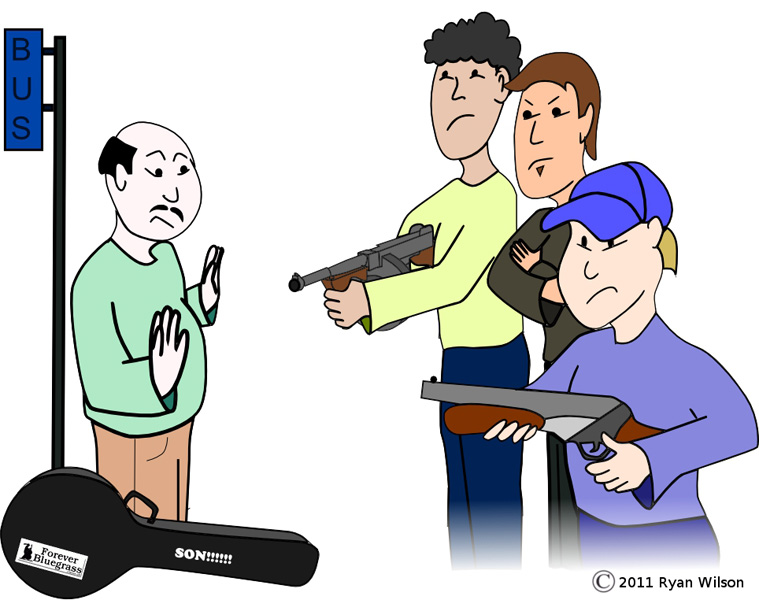
 Having made the mistake of starting on the touchy subject of band personnel changes, their motives, methods, and possible prevention, I guess I have no choice but to finish the job, especially since last week I promised to go into detail about the popular methods of firing bluegrass band members.
Having made the mistake of starting on the touchy subject of band personnel changes, their motives, methods, and possible prevention, I guess I have no choice but to finish the job, especially since last week I promised to go into detail about the popular methods of firing bluegrass band members.
Before delving into this subject further, though, it may be worthwhile to touch on the methods of quitting a band, which are more straightforward: mostly it involves talking to the band leader or your fellow band members (in a more democratic band situation), and working the phrase “I quit” somewhere into the conversation, preferably in a way that someone notices (there’s nothing worse than quitting a band when you are the only one who knows that you did it).
Like firing someone, quitting is almost always awkward. It usually leads to bad feelings, resentment, and only occasionally tears and/or physical violence. You’ll simply have to endure this unpleasantness, and take it as a sign that in fact your “I quit” was heard and understood. If there are none of the above reactions, you may be forced to say “I quit” again, and no one wants to do this twice.
Last week, I outlined the four most common methods in bluegrass music of giving someone in your band the heave-ho. Again, they are as follows:
- Kind but honest discussion with a mutually agreed-upon termination date
- The passive-aggressive squeeze play
- The mob hit style, leave-them-at-a-truckstop method
- The strength-in-numbers committee firing
The most honorable and desirable method (and the most starry-eyed, idealistic one) is the first on the list. It may be rare, and it may be difficult, especially the part about being both kind and honest, but it is worth striving for. For this to work, both sides need to treat the issue and each other with maturity and respect. I did say it was rare.
Even when the discussion seems kind and honest, and there are plans to abide by the “mutually agreed-upon termination date”, this openness and respect may melt away, like so many of Jimmy Webb’s cakes in the rain, less than a day later. At that point, all you can do is try not to be lured into a fight and try to make sure that potential witnesses are present at all times.
In the broader working world, there are accepted conventions in the business of quitting jobs or in the letting-go of employees. In the world of professional music, including bluegrass music, almost none of these are observed, beginning with the concept of two week’s notice.
The “effective immediately” principle is most often used, and I used to regard this as abrupt and unfair (which it is), but there are some solid reasons for it: If you fire someone, even with the kinder, gentler method discussed above, there are likely to be some hard feelings, and these can often manifest themselves in awkward moments during an on-stage performance, from dirty looks, bitter comments on the microphone, exaggerated foot-stomping, to outright refusal to tune, kick off a song, or change out of pajamas prior to the show.
In the situation where someone quits a band, giving two weeks notice, that person is potentially in for 2 weeks of snide comments, or worse, the silent treatment during a 30- hour bus ride to Wyoming.
I’m certainly not advocating immediate termination, or quitting without notice, I’m just explaining why it happens.
You’ll be struck often in this discussion by how many similarities there are between ending a band relationship and ending a romantic relationship, the main difference being that the “It’s not you, it’s me” cliché is used less often (but not never) in band personnel changes. But everything else, from the bitter feelings and tears, to the mind games, yelling, and the destruction of personal property are common characteristics. You’ll notice too that giving two weeks notice in the severing of a romantic relationship is also rare.
Incidentally, in the age of email and text messages, it needs to be said that face-to-face discussion, or, at the very least, a phone call is still the only decent way to leave a band or fire a band member. Though bluegrass is a kind of music that reveres the old fashioned ways, quitting or terminating by regular mail is also a very poor method, especially if you don’t take into account the amount of time it takes the postal service to make the delivery. I know of one story in which a musician quit a band by registered letter, which didn’t arrive before the band drove hours to pick up that member for their next tour. As if quitting a band isn’t awkward enough.
Method #2, “The passive-aggressive squeeze play” is probably the most cowardly way of firing a band member, but it’s more common than you think. This is the technique in which, rather than actually fire someone, you attempt to make that person completely miserable, until he or she quits. There are numerous ways of doing this, as you might well imagine: deliberately losing luggage, not speaking to the band member except to say “Your turn to drive” or “You’re too loud in the monitor”, never informing him/her about what song is being played next, and in extreme cases, having that musician’s likely replacement present on the road and possibly worked into the shows (and always given an embarrassing amount of praise afterwards).
This is a method that often works, but it comes at a high price, especially if it takes six months to a year to achieve the desired result.
The “mob hit” style is also surprisingly common, and it’s just about as cruel as the passive-aggressive method, but it’s a little more courageous, or, at the very least, it’s quicker. I’ll deal with all the ways that bluegrass music is like the Mafia in a future column, but just for now, this firing method may not involve actual physical violence, but it does have the element of surprise and the clean break spirit of an underworld contract killing.
It usually involves taking the victim aside to a quiet place, to the corner of a truckstop restaurant for example, having a pleasant conversation about nothing in particular (“You’re a nice guy. I like workin’ witchoo.”), then, just as the check arrives, the victim is handed a bus ticket home and is left to wait for the Greyhound arriving there later that day (or next Thursday). This scenario can also play out at an airport, with the soon-to-be ex-band member handed a plane ticket home.These are the kinder versions. In the less kind version, the boss asks his victim to wait there while he goes to the bathroom. The boss goes instead to the bus and leaves the poor musician stranded there with no ticket home, no money, and probably the check for lunch. In the extreme version, the victim is pushed out of the bus on to the side of the highway, accompanied by most–but not all–of his/her belongings. This “thing of ours” called bluegrass can be a harsh business.
The final method on the list, the firing by committee (or “firing squad”), is chosen for a few possible reasons: if it’s a democratically run band and no one person wants the job of telling their band mate that they all want him or her gone. Or maybe it’s a band leader situation, but for some reason the leader feels the need for backup, perhaps because the musician being fired is often armed and has a history of assault. Maybe everyone in the band is so mad at this person, they all want a chance to put in their two cents. This can be hard on the person being let go, because it’s easy to feel ganged-up on. On the other hand, it beats being stranded at the Flying J.
Finally, if you’re the person stuck with the unpleasant job of letting someone go, and you’re having trouble coming up with a good way to phrase it, you might turn to the always wise and witty words of the late Jethro Burns (told to me by a friend of Jethro’s in Chicago, John Rice):
“You know what next Friday is? It’s a week since your last gig with us.” Or:
“You can continue to work with us, but you will no longer be paid.”
Next week: Quitting a band by writing a song about it for them (sung to the tune of O Holy Night), why being fired by a band at Christmas time is a blessing in disguise, firing a band member in a foreign language, and how to live at a truckstop for up to three days on $12.50.







